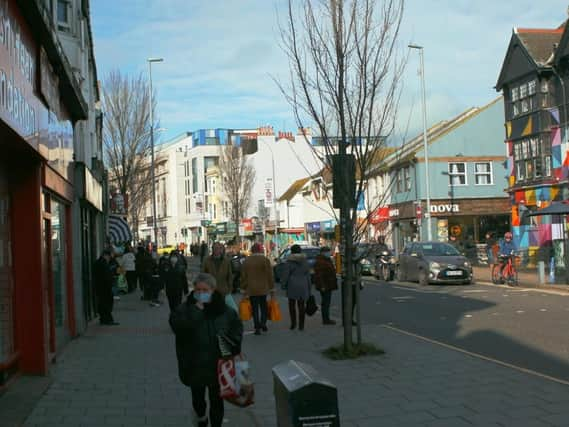New short film explores future of Brighton's high street


The films pose hopeful provocations at a time when these communal spaces have been hit hardest.
In Brighton, three filmmakers have worked with Lighthouse to imagine the high street as a vessel – a container of both commerce and community – and to interrogate what pockets of the high street they want to preserve and protect.
Advertisement
Hide AdAdvertisement
Hide AdCelia Knight, at Historic England said: “Carrying Us follows a journey into the city centre via bus and explores the experience of the high street from different perspectives. It is an audio-visual patchwork that explores the past, present and personal of Brighton’s high street through spoken word and video collage.
“The film is a collaborative project created by Elsa Monteith, Hazel Davis and Adam Laurence, alumni of the Lighthouse Young Creatives programme. As first-time filmmakers, they were guided through the process by Lighthouse and supported by their Storytelling mentor Kitty Wallace to produce the film.”
Hazel and Elsa were both Brighton based.
Emily Kyriakides, business development & partnerships at Lighthouse, said: “Conversations about the future of the high street have never been more critical, with the shifts and changes triggered by the last year. As we start to rethink these physical spaces, it’s been wonderful to continue our journey with some of the Lighthouse Young Creatives, and reassuring to see that their priorities are strongly centred around community, people and a shared purpose.”
“The concept of the film is focused on the idea of containment, inspired by their collective interest in The Carrier Bag Theory of Fiction, by author Ursula Le Guin. The film features layers of phone, camera and archive footage from Screen Archive South East and Historic England to represent different themes. Through narration and spoken word it aims to communicate that the essential aspects of people and community are at the core of the high street.
Advertisement
Hide AdAdvertisement
Hide Ad“Elsa led the script writing process of the project, working alongside spoken word artist Hazel Davis. They wrote and performed the narration in the voiceover for the soundtrack, which frames Hazel’s rhythmic spoken word. Elsa’s cinematography, captured on her phone, is present throughout the film and leads the visual journey, helping to show the personal and human aspect of the film. Adam contributed his experience in sound and music to the project, directing the sound design and composition for the film. He worked closely with the composer & sound designer, Alice Boyd, to create a soundtrack that creates a sense of place, and complements the spoken word and narration.”
Future of the High Street is part of a £7.4million Cultural Programme led by Historic England, in partnership with Arts Council England and the National Lottery Heritage Fund. This programme of cultural activities is part of the £95 million High Streets Heritage Action Zone scheme, which is currently working to breathe new life into more than 60 high streets across England.
The Cultural Programme features new digital and physical artworks inspired by our nation’s high streets. It aims to make our high streets more attractive and vibrant places for people to spend time, work and live.
Ellen Harrison, head of creative programmes and campaigns, Historic England, said: “Historic England is taking a unique approach in combining cultural programming, community engagement and physical regeneration to transform high streets across England. The Cultural Programme’s aim is for artists to work with local people to help them rediscover and express the pride they have in the places they’re from.”
Advertisement
Hide AdAdvertisement
Hide AdElsa Monteith, Lighthouse Young Creatives alumni, said: “We used this opportunity to investigate shared spaces through film, looking at how we connect with our community on the high street, and what that means for our city. Working and collaborating with a professional team provided us with invaluable support and guidance, and an insight into how we understand the past, present, and future of the high street.”
Lucie Rachel, Lighthouse project lead and producer on the film, added: “Producing a short film during a pandemic was never going to be straight forward, but the way the young people responded to challenges with creativity, ingenuity and resilience was absolutely incredible. It has been a great lesson and experience of adapting to changing limitations, and we believe the work they’ve created is genuinely stronger for it.”